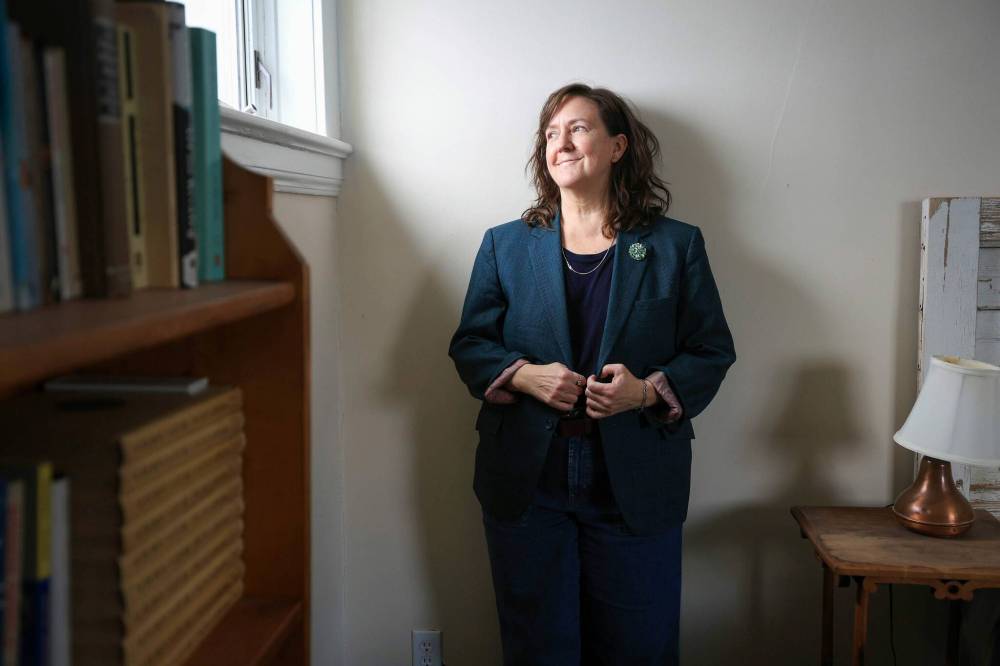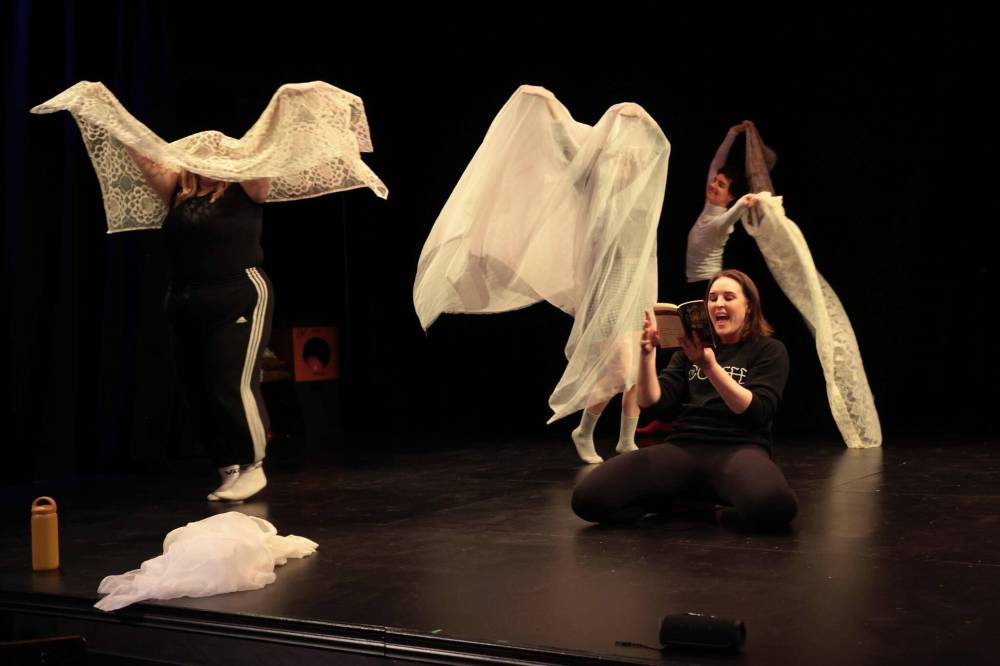
Two years ago, we asked Ellen Peterson about the essentials of playwriting, the must-haves on the theatre artist’s list of to-dos when fleshing an idea out from dream to reality.
“You must know that everyone needs to want something,” she said.
But what did Peterson want? What kept one of Winnipeg’s most tireless theatre workers from growing stagnant? How did she circumvent the trap of invention, where concepts for projects abound but the means to achieve them are usually dictated by the availability of grants, the bankability of the box office and a willingness to wait for someone else’s say-so?

RUTH BONNEVILLE / FREE PRESS
Ellen Peterson designed the Free Theatre to be a creative free-for-all.
This year, Peterson took matters into her own hands, founding the Free Theatre, a pilot project that saw six local artists — Angelina Alberto, Carol-Ann Bohrn, Ava Darrach-Gagnon, Jo Dixon, Delf Gravert and Rae Swan — meet as strangers and within one week develop a brand-new show to be performed to an audience that wasn’t required to pay a single cent.
On May 24, the artists each brought an item as a starting point to develop the show, and by May 31, they had written, choreographed, scored, costumed, propped and performed a fairy-tale-like meditation on the adolescent rejection and eventual acceptance of one’s inner child.
There were glowing jellyfish, off-the-basement-wall dance numbers and a dreamy tribute to the Onion King, played by Gravert.
The artists were paid all the same and were able to perform a new piece in front of a receptive audience at the Gargoyle on Ellice Avenue that might not otherwise have spent its time or its money on a creative free-for-all.
“I think the beautiful thing about this was the freedom to do whatever we wanted,” says Alberto. “In professional theatre, people are thinking about what the audience is and how we’re going to sell tickets and that wasn’t something we had an obligation to think about. Because of that, we were able to do the things that brought us joy and the audience liked it as well.”
“This was a process where ‘success’ was not the goal at all and attaining a role or achieving a new position wasn’t the goal either. It was just about making something,” adds Jo Burdon, who served as the Free Theatre’s development “wizard,” an official title devised by Peterson.
“I think the beautiful thing about this was the freedom to do whatever we wanted.”–Angelina Alberto
Peterson knows a lot about making something. She was a member of the 1980s improv troupe Theatre X and a driving creative force in the earliest iterations of the Winnipeg Fringe Festival, remaining a vital mentor and creator for dozens of theatre artists in the city.
“Our first show was called The Choking Puppet. The profs at (the University of Winnipeg) didn’t want us to do it because they thought we should walk before we ran,” recalls Peterson, who acted this fall in Rainbow Stage’s presentation of the Winnipeg Studio Theatre production of Miss Shakespeare.
“But what if we want to hop around?”
That kind of thinking “keeps the artform static,” Peterson says.
“If you insist that people learn the old ways, then you have to get all the way through that and decide, ‘Now I’m going to do what I really want to do,’ right? But why delay?”
Peterson, along with co-producer Lindsay Nance, could see no reason to stave off originality. Removed from the staid, siloed approach to theatre-making, artists with specialties in costuming, choreography, writing and set design were able to cross departmental borders, something rarely achieved in larger professional productions.
“If you insist that people learn the old ways, then you have to get all the way through that and decide, ‘Now I’m going to do what I really want to do,’ right? But why delay?”–Ellen Peterson
The wide-open development process had the electric feel of the early fringe era in Winnipeg when nobody knew what was impossible.
“They didn’t have enough shows to fill the slots, so in the office they were phoning people up to ask if they wanted to do a show. They call (actor) Maggie Nagle and offer her a midnight slot in the Artspace building. So she called six or eight friends and said, ‘Come up with a cabaret piece. The only rule is you have to wear fishnets. I’ll see you on opening night,’ and that’s how we did it” Peterson recalls.
“It was so great … (playwright/actor) Deb Patterson did the topless accordion player in it, and the late, lamented Donna Lewis would do brilliant, weird things; she interpreted wearing fishnets as wearing an actual fishing net, so she did a thing about a mermaid. Before the show we’d walk over to the Leland Hotel in our fishnets, doling out handbills. Picture seven fetching ladies on the street corner in the Exchange District
“We sold out every night. They licensed the venue, so cold beer might have had something to do with it.”
Discussing her plans for the second edition of the Free Theatre, which just received funding from the Winnipeg Arts Council, Peterson lights up remembering those nights when nobody was afraid to fail.
They might even have been excited to fail, if only to have a story to tell the morning after.

Ruth Bonneville / Free Press files
The Free Theatre troupe rehearses at the Gargoyle before their first show.
“It goes back to Judy Garland and Mickey Rooney. ’Let’s put on a show in the barn.’ It’s all I ever wanted to do — make stuff for the sake of the joy of doing it and to reach other people. We’ve made this whole other thing out of it, but the impulse is there and it’s still the same,” she says.

Ben Waldman
Reporter
Ben Waldman is a National Newspaper Award-nominated reporter on the Arts & Life desk at the Free Press. Born and raised in Winnipeg, Ben completed three internships with the Free Press while earning his degree at Ryerson University’s (now Toronto Metropolitan University’s) School of Journalism before joining the newsroom full-time in 2019. Read more about Ben.
Every piece of reporting Ben produces is reviewed by an editing team before it is posted online or published in print — part of the Free Press‘s tradition, since 1872, of producing reliable independent journalism. Read more about Free Press’s history and mandate, and learn how our newsroom operates.
Our newsroom depends on a growing audience of readers to power our journalism. If you are not a paid reader, please consider becoming a subscriber.
Our newsroom depends on its audience of readers to power our journalism. Thank you for your support.


